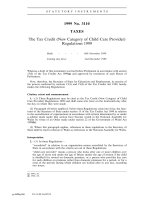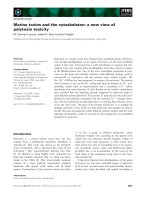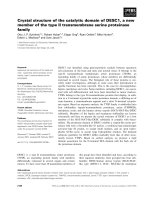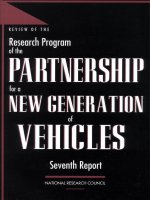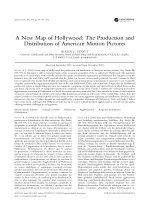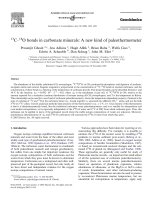brown - civilizing the economy; a new economics of provision (2010)
Bạn đang xem bản rút gọn của tài liệu. Xem và tải ngay bản đầy đủ của tài liệu tại đây (3.11 MB, 282 trang )
Civilizing the Economy
When a handful of people thrive while whole industries implode and
millions suffer, it is clear that something is wrong with our economy.
The wealth of the few is disconnected from the misery of the many. In
Civilizing the Economy, Marvin T. Brown traces the origin of this
economics of dissociation to early capitalism, showing how this is
illustrated in Adam Smith’s denial of the central role of slavery in
wealth creation. In place of the Smithian economics of property, Brown
proposes that we turn to the original meaning of economics as
household management. He presents a new framework for the global
economy that reframes its purpose as the making of provisions instead
of the accumulation of property. This bold new vision establishes the
civic sphere as the platform for organizing an inclusive economy and as
the focus of a move toward a more just and sustainable world.
marvin t. brown teaches business and organizational ethics in
the Philosophy Department at the University of San Francisco and
in the Organizational Systems program at Saybrook University in
San Francisco. His previous books include Working Ethics (1990),
The Ethical Process (2003), and Corporate Integrity (Cambridge
University Press, 2005).
Civilizing the Economy
A New Economics of Provision
marvin t. brown
cambridge university press
Cambridge, New York, Melbourne, Madrid, Cape Town, Singapore,
São Paulo, Delhi, Dubai, Tokyo
Cambridge University Press
The Edinburgh Building, Cambridge CB2 8RU, UK
Published in the United States of America by Cambridge University Press,
New York
www.cambridge.org
Information on this title: www.cambridge.org/9780521152464
© Marvin T. Brown 2010
This publication is in copyright. Subject to statutory exception
and to the provisions of relevant collective licensing agreements,
no reproduction of any part may take place without the written
permission of Cambridge University Press.
First published 2010
Printed in the United Kingdom at the University Press, Cambridge
A catalogue record for this publication is available from the British Library
ISBN 978-0-521-76732-3 Hardback
ISBN 978-0-521-15246-4 Paperback
Cambridge University Press has no responsibility for the persistence or
accuracy of URLs for external or third-party internet websites referred to in
this publication, and does not guarantee that any content on such websites is,
or will remain, accurate or appropriate.
Contents
List of figures page vii
List of tables ix
Preface x
1. Introduction: creating a just and sustainable economy 1
Part I: Creating a new economic framework 15
2. Adam Smith’s silence and an economics of property 17
3. Reclaiming the notions of provision and family 34
4. Making provisions in a dangerous world 45
Part II: The civic option 57
5. From property relations to civic relations 59
6. Society, civil society, and the market 69
7. Restoring reciprocity 83
8. Civic norms and market competition 96
Part III: A civic view of labor, land, and money 107
9. Labor: employment as engagement 109
10. Land: ownership as a concession 121
11. Money: commodity or credit 130
Part IV: Civilizing economic systems 143
12. A world of systems 145
13. Imagining a stakeholder economy 159
14. The ethics of eco nomic systems 178
15. Changing systems of provision 193
Part V: A civic agenda 207
16. The civic obligations of corporations 209
17. Creating circumstances for civic conversations 222
Appendix: Free enterprise and the economics of slavery 235
Bibliography 254
Index 262
vi contents
Figures
1.1 What do we really need? 4
4.1 The economy of human communities 47
4.2 The economy of cities 55
5.1 The civic sphere 60
5.2 A dwelling 66
6.1 The diversity wheel 76
6.2 The context of commer ce 81
6.3 Government and the context of commerce 82
8.1 Terms for tension among persons 100
8.2 The competitive continuum 101
9.1 Two ends of the boat 111
12.1 The system of an economics of property 147
12.2 The system of an economics of provision 148
12.3 Cycle of civic conversations 150
12.4 Carbon cycle 152
12.5 Economy as a system of provision 157
13.1 Economic sectors 160
13.2 Linear versus cyclical thinking 163
13.3 Economic sectors versus systems of provision 165
13.4 Corporate stakeholders 167
13.5 Key stakeholders in an economics of provision 169
13.6 Civic systems of provision 175
15.1 Primary and secondary stakeholders 194
15.2 Stakeholders of the food system 195
15.3 Stakeholders of the automobile system 199
15.4 Stakeholders of the housing system 203
16.1 Principles of corporate design 221
17.1 Civic conversations 223
17.2 Four circumstantial elements 224
17.3 Circumstances that promote civic conversations 228
17.4 Circumstances that block civic conversations 231
17.5 Current economic circumstanc es 232
17.6 Civilizing economic circumstances 233
viii list of figures
Tables
1.1 Economics of property and economics of provision 7
9.1 Two views of labor 117
13.1 Strategies for change 173
Preface
This is not a book I had been waiting to write. At least I didn’t think so.
Now that it is finished, I can see that it belongs to a particular personal
story that began with my participation in the civil rights march from
Selma to Montgomery, Alabama, in 1965, surfaced again years later
with my work in the ethics and diversity training programs at Levi
Strauss and Company, and now continues with a tale of slavery and
economics. That is my story. It is not, however, the primary story of
this book. The book sets up a contest between two economic
frameworks: One is based on property relations and focuses on the
accumulation of property; the other is based on civic relations and
focuses on the making of provisions. The first one treats the planet and
people as commodities and values them by the price they can fetch in
the market. The second one treats the planet and human communities
as living providers and protects them for this and future generations. In
this book, the second framework wins. If it doesn’t win, we all lose.
This contest is not between capitalism and socialism or between
government control and private control. It is a contest between an
uncivilized and a civilized economy. In a civilized economy, economic
transactions are based on civic norms and people in these transactions
are treated as citizens. An uncivilized economy, on the other hand,
ignores the civic rights of persons and measures only what can be
priced. It is based on property relations rather than civic relations. This
is not a new contest. Since the eighteenth century, we have been
slowly replacing property ownership with civic membership as the
basis for our life together. This book brings this evolution of civic
consciousness to the workplace and to the economy.
And what is the connection between the book’s primary story
about a contest between two economic frameworks, and my story
about a white male writer and teacher involved in the history and
legacy of slavery? It turns out that slavery was an integral part of the
creation of wealth in early capitalism, and yet the economic
framework we have inherited from such works as Adam Smith’s The
Wealth of Nations never acknowledges this pivotal part of its
beginnings. Why the disconnect? I don’t know. I do know Smith saw
slaves as property rather than as laborers. They were bought and sold.
Smith, however, remains silent about all of this in his account of
wealth creation. We live with the legacy of this silence, focusing on the
accumulation of property without much regard for those who
provide it.
The crux of the matter is whether we exclude or include the real
providers of wealth in our economic models. It is also about how we
interpret land, labor, and money. Are they properties or providers? It is
about how we interpret property. Is it a private or a government
institution? It is about how we divide up the economy. Should we
think of different economic sectors or of different systems of provision?
It is about who should organize the economy. Should it be property
owners or all citizens? It is a highly charged contest. Obviously, this
book will not settle it. Not at all. I hope the book brings the contest to
the classroom, to the boardroom, to the workplace, and to city
councils, where it can be refined, corrected, and expanded.
In some ways the contest is more about ethics than
about economics. If ethics were about how we should live together,
then economics would be a dimension of ethics. In any case, I would
like to see this book included in conversations about justice and
sustainability, about corporate responsibility, about poverty, about
human rights, about viable communities, and about the process of
making good decisions. There are literally millions of people involved
in these conversations in a multitude of projects and programs in an
untold number of daily activities and practices. They are working to
provide, to protect, and to fulfill the purposes of their communities,
and in such practices one finds the management of making provisions
or economics.
preface xi
This brings me to a central assumption of my work: Words make
a difference. Not always, of course, but in some cases they make all the
difference in the world. If we were to share our understanding of how
we use the word “wife,” for example, we would probably have a fairly
good idea of whether we operate in an economics of property, which
defines wives as property, or an economics of provision, which honors
what wives and husbands provide for each other. In a sense, the contest
between an economics of property and an economics of provision is a
contest over words and more specifically the meaning of words. From
this angle, the book belongs to the practice of loving wisdom – to
philosophy.
For some of us, philosophy begins with Socrates. He said that the
unexamined life is not worth living. That seems to be true. He also said
that he saw himself as a midwife. A midwife? What about the
“economic man” or “rational behavior based on self-interest”? How
could a man see himself as a midwife? Easy. Wisdom is not gender
specific. Socrates loved wisdom, not because he possessed it – it was
not self-love – but because he sought to bring it out in conversations
with others. Above all else, Socrates was a dialogical philosopher. If we
are to have a wise economy, we will need to engage in similar processes
of dialogue – asking questions, examining answers, going deeper – so
we can examine our life together and make it truly worth living. As you
will see, the heart of an economics of provision is the idea of civic
conversations, where citizens engage in deliberations that shape their
common future. Maybe that is what economic midwives do.
Countless conversations with other people have helped birth
this book. Many of the ideas and even words have been borrowed.
Because the book draws on knowledge from multiple disciplines, I
have had to rely on others. Sometimes I was lucky to find a book or
article that answered a question I had just asked. At other times,
colleagues suggested I do more reading or look at some literature if I
was to venture into a particular field. I think the result is a book that
sets an agenda for future thinking more than it provides conclusions to
the arguments in which it engages. So there are many colleagues and
xii preface
friends to thank for their contributions. Many have given me
important encouragement to finish the work, including Michael
Boylan, Georges Enderle, Mike Hoffman, Jim O’Toole, W. Barrett
Pearce, Martha Schloss, Brian Schrag, and, most significantly for my
life as a writer, my family – Erdmut, Mark, and Kirsten. Others have
offered helpful responses to early versions of different chapters or the
completed manuscript, especially Steve Piersanti and Mark Brown, as
well as Mark Becker, Stan Buller, Dennis Jaffe, Jeff Lustig, Tucker
Malarkey, J. D. Moyer, John Moyer, Burkhard Mueller, Julie Nelson,
George Scharffenberger, Murray Silverman, Nancy Southern, and Ron
Sundstrom. I appreciate the insightful and critical reviews by the
anonymous reviewers, and the support and cooperation of Paula
Parish, at Cambridge University Press. I am grateful for the work of
Rich Clogher, who vastly improved the text through his professional
editing. I alone am responsible, of course, for the result of their
contributions to this book.
As you will see, an economics of provision begins with the
recognition of the actual providers of wealth. It breaks the silence
about who really provides for us – the members of our households, the
workers who suffer from the misery of exploitation and exclusion, and
our planet whose life is now threatened by our consumer culture.
Many people have provided for those of us who read and write books,
and they have not always been recognized. If we are to civilize the
economy, all providers must become visible and their contributions
adequately recognized. I would like to dedicate this book to all
providers.
preface xiii
1 Introduction: creating a just and
sustainable economy
Would you vote for a just and sustainable economy? If a just economy
provided for everyone’s basic needs and a sustainable economy pro-
vided for this generation without compromising the capacity of future
generations to provide for their needs, would you vote for that? I think
most of us would. So why is our economy so far away from what we
desire and, in some cases, moving in a contrary direction? It is because
of a mistake – one that will continue to frustrate our efforts to create a
just and sustainable economy until we correct it.
Many of us are aware of the mistake, at least on some level. In
1998, Ray Anderson, the CEO of Interface Inc., told an audience that the
first industrial revolution was a mistake, in spite of all the good that had
come from it.
1
The mistake was that our focus on economic growth had
blinded us to the destruction of the natural environment. Instead of
“captains of industry,” Anderson argued, future generations would see
corporate leaders as “plunderers of the earth.” People inthe early days of
the environmental movement or more recent advocates of sustainabil-
ity have made similar arguments. We are on the brink of bringing chaos
to the planet like it has seldom seen before. Al Gore, among others, has
worked tirelessly to get us to recognize this “inconvenient truth.”
2
What is the mistake? In a nutshell, it is to base our economy on
property and property relations. In fact, it was the cause of our blind-
ness to the planet’s life. Even before the beginning of the industrial
revolution, economics had been framed as the production and trading
of properties among property owners. This meant that whatever could
1
Ray C. Anderson, “A Spear in the Chest,” lecture at North Carolina State University,
February 26, 1998, No. 1.
2
An Inconvenient Truth: A Global Warning, Paramount Classics and Participant
Productions, 2006.
not be treated as property was not recognized as having economic
value. The dignity of persons, the attachments of families and com-
munities, as well as the planet as a living system were and are invisible
to this economics of property. If we are to protect these living systems
from destruction, we must create a new economic framework. The aim
of this book is to outline a plan for correcting this mistake. Central to
the plan is to create a new story of how we provide for one another: a
civic economics of provision.
The current economic story has its origin in the eighteenth
century during the Scottish Enlightenment, at the beginning of the
first global Atlantic trade between Europe, Africa, and the American
colonies. During this period new theories of property and property
relations were developed to explain and to justify the Atlantic econ-
omy, which involved the enslavement of more than eleven million
Africans to supply the labor for the growing economies of the
Americas. Slaves, at the time, were treated as property. They received
no more sympathy and consideration than cattle or horses. This is a
hard truth, but it is the dark stain that continues to influence how
many of us think about economics today. The refusal to integrate this
history into our views of Anglo-American economic development
prevents us from telling the truth about the current destruction of
the environment or to acknowledge – really acknowledge – the misery
of workers today who provide us our goods. But facing this history is
the only way out of the economics of property and into an economics of
provision that could save the future for our children and grandchildren.
The economics of property, as it has come down to us over the
past three centuries, disconnects the burden borne by the real pro-
viders of wealth – Adam Smith’s silence about the role of slaves in
creating wealth is a perfect illustration – and leaves society with a
belief in the benevolence of the market’s “invisible hand.” (The
Appendix contains a more detailed examination of the economics of
slavery and free enterprise.) In the following chapters, we will contrast
this dissociative economics to the idea of a civic economics of provi-
sion. The framework of an economics of provision integrates the three
2 civilizing the economy: a new economics of provision
basic practices of any human community: providing for one another,
protecting one another, and creating meaning together.
This view of economics has both classical and modern adher-
ents. In Aristotle, we see the origins of the idea that the economy
belongs to the civic sphere. More recently, Julie A. Nelson writes in
her book Economics for Humans that the purpose of the economy “is
about the provisioning of goods and services to meet our material
needs … the way we manage our time and money so we can obtain
groceries and shelter and thus ‘keep body and soul together.’”
3
Daniel
W. Bromley, in his philosophical work on subjective pragmatism, also
writes that economics should be about “how societies organize them-
selves for their provisioning.”
4
Although neither author uses the
notion of provisioning as a major theme, they open the door to such
an approach. The real economy, it seems to me, should be evaluated
and improved in terms of whether or not people actually are able to
make provisions for their families and communities.
Some economists may feel that I am trespassing on their terri-
tory, but I am really trying to change our understanding of the territory.
The language of trespassing, after all, belongs to an economics of
property, which I hope to replace with an economics of provision.
Furthermore, we should remember that Adam Smith was a moral
philosopher, not an economist. How we envision the economy, in
other words, is not so much an economic question as a philosophical
question, and, more specifically, an ethical question. Ethics, after all, is
about how we should live together. The answer we give to this ethical
question will finally determine our understanding of economics.
This book provides a new framework for t he global economy that is
based on the origina l me aning of economics – household m anagement.
Household management was about making provisions, not accumulating
3
Julie A. Nelson, Economics for Humans (Chicago, IL: The University of Chicago
Press, 2006), p. 1.
4
Daniel W. Bromley, Sufficient Reason: Volitional Pragmatism and the Meaning of
Economic Institutions (Princeton, NJ and Oxford: Princeton University Press, 2006),
p. 180.
introduction: creating a just and sustainable economy 3
property. Some g roups and organizations are a lready thinking this way.
The commercial carpet company Interface Inc., for example, thinks in
terms of providing a service that covers floors rather t han being a business
that sells c arpets as a product.
5
Interface fo und that commercial clients do
not want to own a carpet, but they do w ant their floor to be covered
nicely. By providing what buildings need, Interface has been able to make
its business much more sustainable than it was before. They manage the
whole process of m aking, maintaining, and recycling the floor coverings
they offer. Figure 1.1 gives more examples of how a switch from an
economics of property to an economics of provision would change our
way of thinking – from thinking about products and commodities to
thinking about provisions and services.
In our modern economy, of course, making provisions occurs
through various systems, such as the transportation system or the
health-care system. These systems can be seen as “systems of provi-
sion” that could be organized to make provisions for all. How they are
organized, of course, is a major question. Many people see only two
organizing options: capitalism or socialism. This book offers a third
option: a civic option. As citizens, guided by such civic norms as
reciprocity, we can engage in civic conversations to turn economic
systems toward sustainability and justice. If we are smart citizens, we
will not discard things that can work, such as markets and property
rights, but we will also not allow them to control our fate.
In a sense, moving from an economics of property to an econom-
ics of provision continues the ongoing shift from ownership as the basis
We don’t need commodities; we need provisions.
We don’t need a large retirement account; we need security.
We don’t need an automobile; we need access.
We don’t need to own a house; we need privacy and security.
We don’t need a big expense account; we need contacts.
figure 1.1 What do we really need?
5
www.interfaceglobal.com/Sustainability/Our-Journey/Interface-Model.aspx
4 civilizing the economy: a new economics of provision
for citizenship to citizenship being the basis for ownership. In the
eighteenth century, ownership was really the basis of full citizenship
and the right to vote was contingent on property rights. In some states,
citizens without property did not get the right to vote until 1850.
Women did not achieve full citizenship until the twentieth century.
The economy, however, has continued to remain under the control of
property owners. It is time – in fact, is it past time – to replace property
rights with civic rights as the basis for our life together.
The new framework outlined in the following chapters does not
eliminate property rights. Instead, it places them in the context of
making provisions. An economics of provision does not eliminate the
market, but it sees civic relations rather than market relations as a basis
for a global community. Non-market norms and institutions – things
such as stability, trust, and the rule of law – already provide a foundation
for market transactions. Labor unions, government legislation to protect
workers and the environment, and financial regulations have also con-
strained the reach of an economics of property. Nonprofits and vol un-
tary organizations are doing amazing things to help people’slives.Inhis
recent book Blessed Unrest, Paul Hawken presents the work of many of
these groups, which hecalled “the largest movement in the world.” This
movement, he believes, now includes between one and two million
organizations.
6
These non-governmental organizations are growing all
over the world as people of all ages try to protect themselves and the
planet from the current trends of an economics of property. In an eco-
nomics of provision, all these non-market programs and protections will
be strengthened so that all persons will be treated as citizens existing in
relationships of basic moral equality and reciprocity.
An economics of provision is not so much a new economy as
a new framework that gives us a perspective from which we can see
what really happens in economic transactions. It is also a framework
that is informed by and supports such current ideas about economic
6
Paul Hawken, Blessed Unres t: How the Largest Movement in the World Came into
Being, and Why No One Saw It Coming (New York: Viking, 2007), p. 2.
introduction: creating a just and sustainable economy 5
development as Amartya Sen’s notion of measuring human develop-
ment in terms of the capacity of people to get what they have reason to
value.
7
To understand more of what an economics of provision
actually offers, we may examine how an economics of property and
an economics of provision would answer the following questions:
1. How are the ethical and the economic related?
2. What is the economy’s purpose?
3. What is the basis of economic relations?
4. What is the relationship of commerce, society, and the civic?
5. Who organizes the economy?
6. How do you calculate value?
7. What is a corporation?
8. How can we change the economic system?
9. Who has the power to change the economy?
Table 1.1 summarizes the differences outlined in this chapter between
an economics of property and an economics of provision. To under-
stand an economics of property today, we need to make the distinction
between its theory and its practice. In many cases, the practice makes
more sense than the theory, which is why things are not worse off than
they are. On the other hand, the theory has also prevented changes in
practice that could have moved us toward a just and sustainable econ-
omy. In Table 1.1, the first two columns show some of the differences
between theory and reality in an economics of property. The third and
fourth columns pertain to the economics of provision, detailing its
theory and how it could be implemented. Brief explanations of the
nine key differences between the two frameworks follow.
1. the ethical and the economic
In an economics of property, the invisible hand of the market main-
tains relationships, so the moral dimension of economic relationships
is suspended. The only ethics is that of the virtues of the private
7
Amartya Sen, Development as Freedom (New York: Alfred A. Knopf, 1999), p. 74.
6 civilizing the economy: a new economics of provision
Table 1.1 Economics of property and economics of provision
The economics of property The economics of provision
The stated theory The reality The theory Its implementation
1. How are the ethical
and the economic
related?
The economic is
self-regulating
and self-
contained. Does
not need ethics.
The belief in self-
organizing
systems suspends
the moral
dimension of
economic systems.
Recognizes the
moral dimensions of
human relationships
in systems of
provisions.
Ethics of purpose examines the
good that any system is a im ing
for. Ethics of protecting
examines a system’sfairness.
An ethics of provision
examines a system’sinclusion
and improvement.
2. What is the
economy’s purpose?
Increase personal
and national
wealth.
Ensure the
protection of the
privilege of
property.
Make provisions,
protect providers,
and create a
worthwhile purpose.
Protect providers from
exploitation and degradation.
3. What is the basis of
economic relations?
Impersonal
relationships of
property (labor,
land, and money).
Owners of property
are privileged as
traders of labor,
land, and money.
Civic sphere is
recognized as the
basis for economic
relations. Land,
labor, and money
treated as provisions.
Citizens exchange provisions of
land, labor, and money based
on civic norms of reciprocity
and moral equality, plus
responses to supply and
demand.
Table 1.1 (cont.)
The economics of property The economics of provision
The stated theory The reality The theory Its implementation
4. What is the relation-
ship of commerce,
society, and the
civic?
The social is
privatized, and
the commercial
defines the civic.
The commercial
causes and
maintains social
inequalities, and
dominates the
civic.
The civic serves as the
platform on which
citizens re-organize
the commercial to
alleviate social
divisions.
All persons are recognized as
having the human right of
moral equality and the civic
right to live in relationships of
reciprocity.
5. Who organizes the
economy?
Organized by
system dynamics
(“invisible hand”).
Organized by the
elites in business
and government.
Organized by citizens
through
representative civic
deliberations on how
to live together.
Civic conversations in many
different settings use
persuasion, incentives, and
regulations to organize the
economy.
6. How do you
calculate value?
Determined by price
in market
transactions.
Determined by both
price and
structures of
privilege.
Determined by a
combination of
reciprocity and
market price.
Laws such as a “living wage” set
floor for wages, while demand
determines supply of goods
and services.
7. What is a corpor-
ation?
The c or por ation
belongs to owners,
and should be
managed for profit.
Corporations are
seen as powerful
agents in control
of earth’s future.
The corporation is also
a human community
designed to provide
goods and services.
Corporations collaborate with
other agents in civic systems
of provision to make
provisions for all.
8. How can we change
the economic
system?
Change individual
preferences.
Random change
occurs with new
technology,
profit-making
adventures,
advertising, and
government
regulation.
Three ways to change
systems:
*
Laws and
regulations
*
Incentives
*
Persuasion.
The public and private agents in
a system of provision
collaborate to change the
system through government
regulations, incentives and
disincentives, and a shared
vision of their civic
obligations.
9. Who has the power to
change the
economy?
Changing the
economic system
is not necessary.
Power resides in
consumer
choices.
Corporate change is
limited by the
“business case,”
which requires
that any change
will not limit the
profitability of
corporations.
Citizens have the power
through collaboration
in private and public
agencies to define the
civic obligations of
all members of
various systems
of provision.
In different settings, citizens
need to create the
circumstances for civic
deliberation about the best
courses of action.
individual. In light of the civic ethics of Aristotle, which we will be
using throughout the book, this amounts to a privatization of ethics.
By contrast, an economics of provision recognizes the ethical dimen-
sion of relationships among providers and the provided, which includes
considering the good that any economic system should provide, the
protection from harm that providers deserve, and the justice of any
distribution of provisions.
2. the economy’s purpose
In a property-based economy, purpose resides in individuals who are
motivated by self-interest to increase their property through trade. The
economy itself as a system is largely invisible (Smith’s invisible hand)
and its “purpose” is to facilitate the accumulation of personal and
national wealth through trade. An economics of provision returns to
the original meaning of economics – household management – and
restores the purpose of the economy to that of making provisions for
families and communities.
3. the basis of economic relations
A property-based economy treats labor, land, and money as commod-
ities, and recognizes only property owners as decision-making partic-
ipants. The problem here is that the sources of wealth are not really
commodities. Land is part of a living, natural system that provides us
life. Labor is the work of women and men providing for themselves and
each other. Money provides credit to the creditworthy so they can
improve their conditions. An economics of provision not only reveals
the true character of these providers of wealth, but also highlights the
implicit civic sphere that has been made invisible by Smithian eco-
nomics. It is global citizenship not property ownership that serves as
the basis for economic transactions. All groups that have a stake in
economic transactions should be represented in the decision-making
process of how to manage the economy. This means that the economy
is for all stakeholders, not just for property owners.
10 civilizing the economy: a new economics of provision
4. commerce, society, and civil society
In the economics of property, there are only individuals and markets.
Ignoring the social, of course, does not make it disappear. Indeed,
markets are embedded in social relations – relations of class, gender,
race, age, and so on. These social divisions shape the participation of
different groups in the market, as well as creating different perceptions
of everyday life. An economics of provision recognizes the reality of
social divisions and conflicts and facilitates their mediation by high-
lighting the civic sphere in which all people are recognized as global
citizens with equal civic rights. The civic, in other words, creates a
context for both the social and the commercial.
5. who organizes the economy?
The Smithian tradition sees the economic system as self-organizing
and self-regulating. Given this assumption, it makes sense to protect
it from government intervention, just as we should protect the
self-organizing dynamics of the biosphere from too much interference.
This assumption, however, is false. The economy is not a natural
system. It is organized and maintained by individuals and organiza-
tions. It is currently organized mostly by business and government
elites. The economics of provision calls for a deepening of democratic
attitudes that would encourage citizens, at different levels of involve-
ment, to participate in organizing the economic system.
An economics of provision suggests that we think of a stake-
holder economy in which all persons and groups that have a stake in
economic activity are represented in the processes of organizing how
the economy provides for families and communities.
6. the determination of value
In an economics of property, price determines value. At least that is the
theory. If you get only 8 cents an hour for your labor, that is because of
supply and demand. Other people will work for that amount so why
should you get more? The reality is quite different. People without
introduction: creating a just and sustainable economy 11
